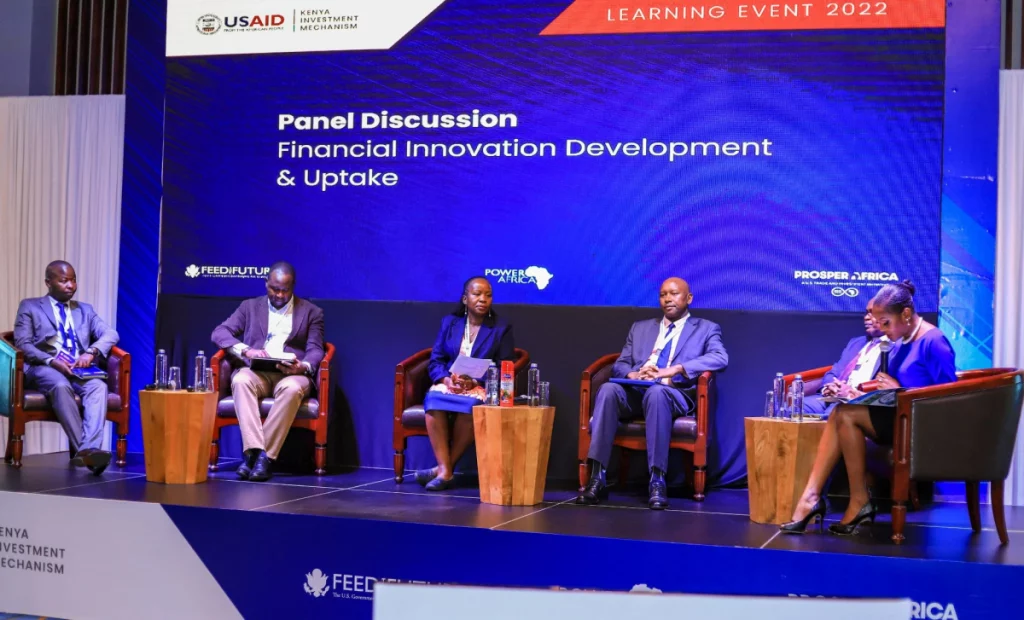USAID, Kenya Investment Mechanism(KIM) held a learning forum themed ACCESS and Impact mainly to empower SMEs, Informal business persons and the agriculture sector players.
The event presents a knowledge-sharing opportunity for businesses to access funds for investments by SMEs and farmers.
During the event, Ann Mwenje KIM’s Financial Institutions Director said that through togetherness and coordination there is to be the ability to consult, plan and arranging of enterprise documents from production to marketing.
“Such data if well documented will enable investors to be enlightened making the chances of funding simpler for business,”
Mwenje cited that the main challenge is the informality of the businesses in Kenya which makes it appear difficult for the financial institutions and commercial banks to chip in.
Urging on the importance of consulting which is a service offered by CMA, BASPS that have been around for a while other than for the less awareness of their need and value. It’s through consulting that farmers are able to comprehend that grouping in social groups heightens their chances of getting funds to equip their production.
Despite the narrative that has been ongoing which has an apparent result of fewer commercial banks and financial institutions having a will to invest in the agriculture sector and players. As much as others are willing to offer loans and funding there is a bit of challenge in the response time since seasons keep shifting which dictates swift actions, in terms of planting, weeding and input of fertilizer periods.
Evidenced is the will by Commercial, Investment banks and Financial Institutions from the steps they are taking to empower women and youths’ SMEs, MSMEs and farmers in support and financial inclusions.
Such as Family Banks’ partnership with Value for Women to further the enabling conditions for women in business and agriculture.
Through scrutiny and consultation of products to bring to the market, farmers are able to impact the market as they come up with a scarce product in the avenue. Empowering farmers need to entail financing from the production level to enable farmers to make proper returns.
One of the ways farmers can benefit is the Juhudika Application which not only enlightens farmers but also enables access to loans for farmers irrespective of the paper works loads.
Julian Mitchell CEO Inspira Farms, said that the major challenge is few and at times no consultations are done by farmers while this is a necessity as the farmer gets to select the best products, and technology most eligible.

Recommending that the Commercial banks and Financial Institutions better head out to the field for quicker and deeper comprehension of the challenges faced on the ground by the farmers to enable mitigation.
According to IProcure, focusing on the identity of products that leave gaps in the agriculture value chain can assist hugely in the concentration of production in the missing product or scarce with higher demand.
With the move by the government to foster policies that are able to safeguard agricultural sector players easing of innovation and technology use in scaling high of this sector.
Kenya being not only a developing country but also a frontier market, through reduction of the export taxes is going to iron out the growth of our production SMEs and production sector. As this will deem massive opportunities for Kenya’s goods to be traded efficiently with the East African Community, the United States of America and various parts of the globe.
USAID has been working with the Government in identifying opportunities, supporting the players involved to nurture them and increase production. This is aimed at ensuring every business person in Kenya is able to be fully self-reliant.
Based on a report by Benson Kiramiti of USAID, over 400 SMEs have been able to access up to 485 Million USD from Financial Institutions and Commercial Banks.
Goes ahead to advise the SMEs, and farmers that even though funding is at most times viewed a s a bulletproof for a business, most startup businesses tend to suffer mainly from management and operations accountability.
Challenges Surrounding Financing of SMEs
Most MSMEs, and SMEs are at most times informal that lack documentation of operations and accounting of the daily operations and expenditure.
A failure by business owners to have a concrete foundation setting their vital strategy aligned with the goals as well as vision.
Inadequate professionalism makes it difficult to attain investors or even funding due to a difficulty in arriving at consistent servicing rates and duration.
Financial shift whereby upon receiving funding, some business doers are able to reconsider the initial business in a rush to go for more lucrative ideas like Real Estate.
Farmers are subjects of climate change effects deeming their production and seasons dependent on the shifts in climate change that has become unpredictable.
Hon David Osiany, CAS Industrialization and Trade.

Mr Osiany by commending the efforts to revive and fully empower the agriculture sector for indeed the world stage faced with a food crisis, this will set us as a nation at a better scale and ability to stand up to the economic crisis.
Persisting on the term ‘shared prosperity’ as one that is powerful and cuts across which upon execution diligently would mean steady growth.
“Shared prosperity is a term that cuts across considering the theme ‘Access and Impact’. Shared prosperity urges and calls for access to markets, technology efficiency, finances, and set up of ore affordable credits,” he added.
Proceeded on to calling for a setup of dignified working places that will ease the ventures of business persons by the provision of spaces and knowledge of the right steps for growth in consultations.
In reference to World Bank indexing that happens to rank Kenya third in the continent in business ventures growth and growth of diverse markets with various needs to fulfil.
Mr Osiany called on the Commercial Banks receiving funds at lower rates to further offer these incentives to SMEs at even better rates that will assist impact the rates of performance and output from the businesses.
Emphasizing on the issue of lack of knowledge that needs to be curbed enables SMEs to have efficient knowledge of the availability of these schemes for their support.
Mr Osiany said, “quality consulting services are a major gap in business growth and operations hence a pointer for BASPS and Financial Institutions to involve themselves with their beneficiaries, organizing more reach out forums in creating awareness for SEs and farmers.”
“For my people suffer due to lack of knowledge.”
The Industrialization and Trade CAS shared his conviction that through the empowerment of the farmers, youths and women who are deemed the backbone of the economy, an impact shall be visible in the economy which will ensure a safeguarded future.
About the Author
Kwabe Victor
Contributor
Multimedia Journalist. Aspiring documentary/Investigative journalist, currently immersed in writing Political, Business and Human Interest Stories. Speak Life.
















